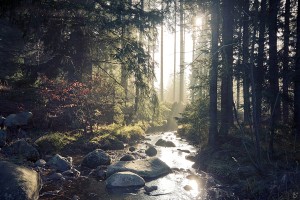
Moving Water
When you do things from your soul, you feel a river
moving in you, a joy.
When actions come from another section, the feeling
disappears.
Don’t let others lead you. They may be blind or, worse, vultures.
Reach for the rope of God. And what is that? Putting aside self-will.
Because of willfulness people sit in jail, the trapped bird’s wings are tied,
fish sizzle in the skillet.
The anger of police is willfulness. You’ve seen a magistrate
inflict visible punishment.
Now see the invisible. If you could leave your selfishness, you
would see how you’ve been torturing your soul. We are born and live inside black water in a well.
How could we know what an open field of sunlight is?
Don’t insist on going where you think you want to go. Ask the way to the spring. Your living pieces will form a harmony.
There is a moving palace that floats in the air with balconies and clear water flowing through, infinity everywhere, yet contained under a single tent.
Thesis Planning:
- Contentment comes from integrity when righteous acts
- When they are self-righteous than it is evil regardless of the act. Maybe since it removes the proper intention from the act and possibly could be replaced by evil intent
- One’s actions are guided by self-will therefore the influence of others can actively deceive the mind
- But self-will alone is also harmful if one cannot overcome inner evils and hypocrisies
- It is because of one’s mentality that they imprison themselves within this world
- One must ask and question themselves as to how their life should be carved
- They should want to see amazing and beautiful aspects of the world
- This perception is stolen by one’s own selfishness
Thesis Statement:
When a hesitant individual truly desires to accept a life of redemption they will be faced by both internal selfishness and external social pressures. This will entrap the individual in a cyclical pattern of desiring to act righteously but then being hindered by the reoccurrences of negative mentalities. It is only when the individual accepts into contemplating the nature of their past decisions that they will uncover a new, profound identity.

